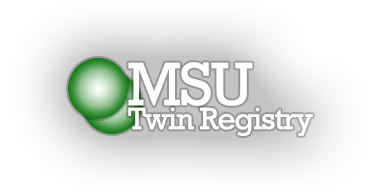General Information
General Information
The Michigan State University Twin Registry (MSUTR) is a large (over 30,000 twins), population-based twin registry that is co-directed by Drs. S. Alexandra Burt and Kelly Klump in the Department of Psychology at Michigan State University (MSU). Twin studies are exceptionally strong tools for examining the etiology of a trait or disorder, as they allow for the examination of genetic influences across multiple levels of analysis (latent and molecular) and layers of risk (environmental, biological, and epigenetic). The MSUTR capitalizes on the inherent strengths of twin methodology to build a leading resource that fosters innovative scholarship in health and genetic research.
Recruitment into the MSUTR
The majority of recruitment into the registry occurs through the Michigan Twins Project (MTP), a mail-in survey with questions about basic demographic characteristics, twin zygosity, birth variables (e.g., birth weight, birth complications), and family history of approximately 40 medical and psychiatric illnesses. Parents of twins between the ages of 3 and 17 years complete a questionnaire for the entire family, while adult twins (ages 18-55) receive and complete their own survey. By answering a future participation question, twins and their families indicate whether they would be interested in participating in future research studies (>95% of twins/families say yes). In addition to the potential for recruiting these twins for further research, answers on the health questionnaire can be immediately analyzed to quantify genetic and environmental influences on major health conditions.
Twin Study Designs
The unique relationship twins share allows for a variety of study designs, depending on the specific research question being investigated. Some examples of these designs include:
Classic biometrical twin study: Comparison of monozygotic and dizygotic twins in relation to a certain condition or behavior; used to determine the relative contributions of genetic and environmental factors
Co-twin control/Case-control study: Comparison of paired twins discordant for a certain condition or behavior or the comparison of case pairs and control pairs; advantageous for low base rate disorders
Longitudinal study: Assessment of twins across time and contexts; particularly useful to over-sample high-risk individuals for low base rate disorders
Children-of-twins study: Assessment of twins and their children; used to examine the dynamic interplay of genes and the environment across generations and family structures
Conducting Research with the MSUTR
We welcome investigators to make use of the MSUTR in their research programs, whether through the analysis of de-identified MSUTR health data that has already been collected or through new data collections tailored to their specific research questions.
For more information on these opportunities, please see the Access MSUTR Data page and feel free to contact MSUTR Project Coordinator, Danielle Andrews (andre260@msu.edu), or either of the MSUTR Directors, Dr. S. Alexandra Burt (burts@msu.edu) and Dr. Kelly Klump (klump@msu.edu), with any questions.
MSUTR Flyer and Newsletters
Our flyer contains general information about the registry in a compact, easy-to-share format. Please click the link below to download a copy to print and pass out or forward to investigators that you think might be interested in learning more about the MSUTR.
Download Flyer
The MSUTR also publishes newsletters with information for interested investigators, including updated MSUTR statistics, details on how to access registry data, and recent findings from research done in collaboration with the MSUTR. Please see below for the newsletters published to date.

